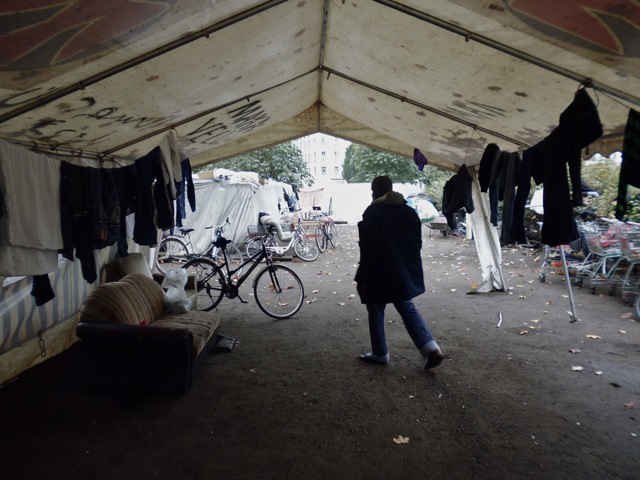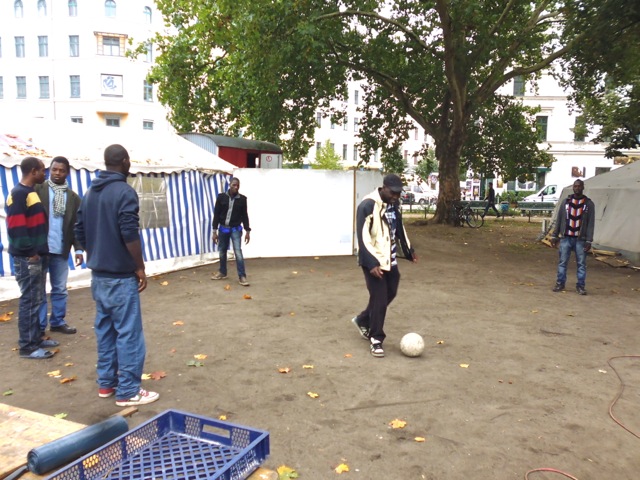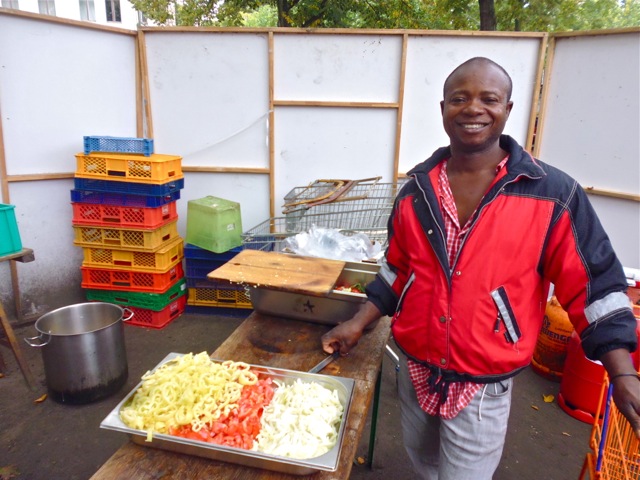The Refugee Camp in Central Berlin
How did you make your way to Berlin, Ali?
Overland to Libya from Mali, he paid a human smuggler almost a thousand euros to take him by boat to Lampedusa in Italy. ‘The sea was rough. We were maybe 1200 hundred people on one boat, there was no room to sit down––but you could hardly stand up the waves were rolling so high. We travelled for 48 hours. Sometimes, if the navigator is unskilled, you’re at sea two weeks. We were lucky’.
Lucky? Thinking about the more than two hundred who died at sea this week in Lampedusa, many bodies simply washing up to shore, he does seem lucky. He spent months struggling in Italy until he was encouraged north, to arrive in Berlin last autumn. ‘Europeans are so racist’, he tells me, ‘Berlin’s only a little bit better, but the weather here’s no good. But what should I do? In Mali, there’s a war’. He’s spent one terrible winter here in an unheated tent and doesn’t want to spend another. ‘We want a house, a place to live, and papers to work. That’s why we have set up our camp on Oranienplatz [in Kreuzberg]’.
It’s uncanny to see a refugee camp in the centre of Berlin–– third world conditions in hipster central. The hundred-some refugees from Mali, Ghana, Nigeria, Cameroon, and other African countries are protesting against the injustices waged against migrants in Fortress Europe.
I stumbled across Ali in the dark last night, walking home from a dinner just across the square. I was full of wine and bonhomie. He was shivering and disconsolate, and told me his story when we found a common language, between French and Arabic. The meeting left me very uneasy: it’s one thing to know that misery is happening all around the world and quite another to see such terrible conditions on one’s doorstep. I noticed that the migrants had a list in front of their ‘infopoint’ with foods they need: cooking oil, rice, vegetables, meat. There’s also a preposterous electricity bill of more than six thousand euros to be paid. Ali gave me his phone number when I told him I wanted to bring by some food.
I called him this morning and came by with my bike loaded down with plastic bags. What does one eat in Mali? I don’t have the foggiest idea: how about pomegranates? Olives? I could bring them only the obvious––carrots, potatoes, apples, beans––but they are probably tired to death of just the staples. The corn nuts were a hit, so was the Thai hot sauce.
We chat: they are very ceremonial and some speak with me in very clear Fusha (Classical Arabic). They’ve probably learned it in the Mosque and seem particularly happy to speak it, maybe because they don’t hear it that often from Europeans. I sense a certain pride and education in the way they converse, it makes their current conditions all the more uncanny. The men (for I’ve only seen men here, their families are back in Africa) make insightful comparisons between their experiences in different countries––they have travelled across half the world to come here, after all––and many code-shift easily between Italian, French, English and even German (which they all complain is too difficult).
A young man from Cameroon guides me around the camp of large communal tents. A group of men try to fight the boredom playing football, the grass everywhere turned to mud. Journalists mill around taking pictures and interviews, and I sense fatigue among many residents from all the questions.
Meanwhile, choices are being made in the realm of local politics: Will the camp, which has been here already one year [!], be forced out? The Federal government’s human right’s commissioner, of the FDP, is pushing (for ‘humanitarian’ reasons) that the camp be disbanded. He says it’s ‘degrading for them to live under such uncertain circumstances’. A humanitarian deportation? It’s true that in the meantime they can only beg, because they are not entitled to asylum and they do not have the right to work.

Senators from the CDU are calling for the camp to be broken up while Kreuzberg’s ruling Greens allow it to continue. The space is considered an eyesore, but isn’t that rather the point? To make the horrors of these places of ‘exception’, which are now such a fundamental part of European life, visible instead of pushing bare life to the periphery? Meanwhile, there’s plenty of squabbling and winter is coming. One wonders whether something more civilised will finally be done given the tragedy unfolding off Lampedusa.
The young man from Cameroon finally takes me into the living spaces: here’s where we cook––the chef was cutting onions and tomatoes outside a rusty old trailer. Here’s where we wash clothes––they hung on hangers in the cold morning, I imagine the jeans freezing in a month. Where are the showers? There are no showers. Here’s where we sleep––and he opens the flap to a tent and inside there are dozens lying on old pieces of furniture, wrapped in blankets. It is claustrophobic and squalid, everyone struggling for a little warmth.
My guide gives me a look I recognise as embarrassment when I ask if I can take a picture of the crowded tent interior. I am self-conscious when the camera flashes and a lying body turns away towards the tent wall. My guide looks nervous and is happy only when we are both again outside.
I turn to ask what kind of action would help them the most.
He looks at me like I’m stupid: ‘To get papers to stay and work, of course. We need a start’.
I nod. It’s my turn to feel embarrassed, my camera dangling from one hand. It’s a no-brainer.
And to think I felt good about myself for bringing them corn nuts.












Why can’t they get asylum?
From what I understand, their first point of entry into the EU was Italy, and so Italy must process asylum claims, not Germany. The doctor treating the migrants in Oranienplatz claims that Italian authorities actually paid some of the migrants 500 EUR each to leave the country and go north! The system is obviously broken. I’d be interested if others have more specialised knowledge on how the claims process works.